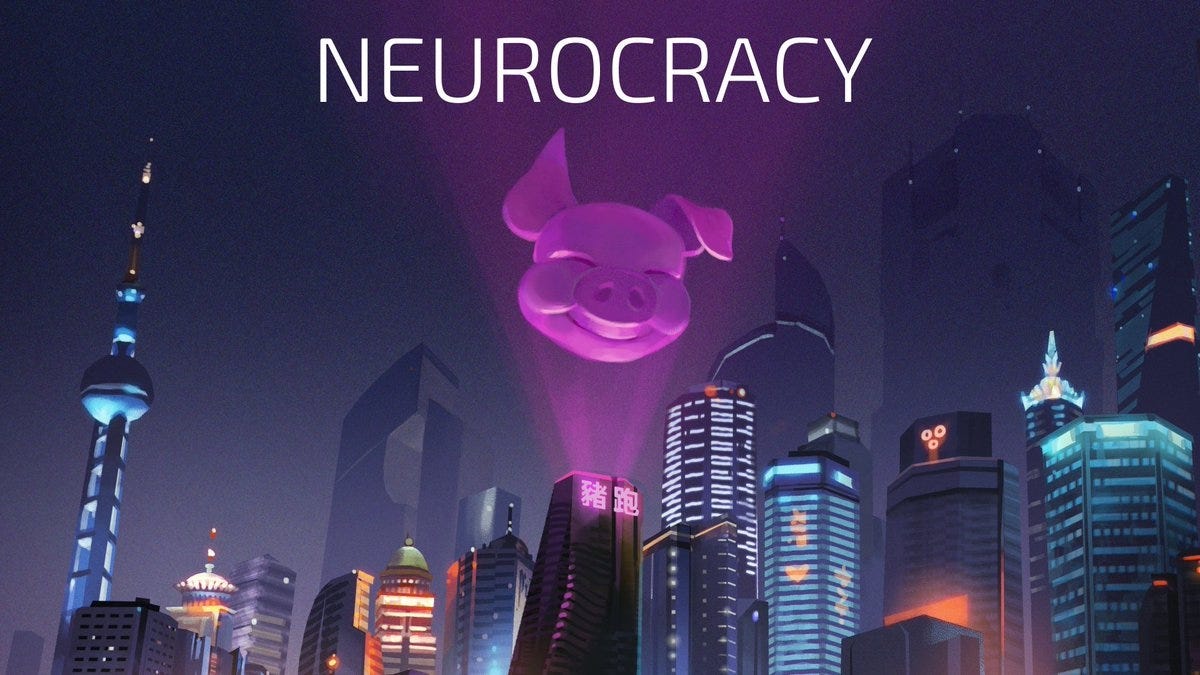Neurocracy is a browser-based cyberpunk murder mystery story told over the course of 10 real-world weeks and 10 in-game days, through the hypothetical successor to Wikipedia, Omnipedia. It presents a dystopian future in which escalating pandemics have driven the global community to abandon individual privacy in favor of pursuing total “bio-security.” The game has interesting things to say about emerging trends around pandemics, public health, and state sovereignty. I am not, however, here to talk to you about those aspects today I am here to tell you about the worst part of its corporatized, surveillance-state hellworld: The future is very boring.
Which is not to say that Neurocracy is poorly written or delivered (it’s not), or that its plot isn’t engaging (it is!). The writers do a great job of simulating a megacorp-sponsored, brand-safe Wikipedia. And therein lies its most subtle, and my favorite, critique of our hyper-capitalist future: that standardization, algorithmic content production, and strict moderation will prevent people from being weirdos publicly.
You play Neurocracy by following hyperlinks through a fictional corporate follow-up to Wikipedia in the year 2049. This means that the majority of your time playing the game will be spent reading, putting together clues, and discussing the theories with other players. It is being released episodically over 10 weeks, with the first episode acting as a free intro for the game. As of today, it is up to episode eight.
The game’s Wikipedia equivalent, Omnipedia, also includes a historical lookback function much like real-world Wikipedia—letting you see the history of previous edits—and the game does its most interesting storytelling through this view. Seeing minor editing changes between two days can tell you so much about the world. When the initially neutral word “search” turns to the accusatory and hungry “hunt,” so much is conveyed to you about the priorities and shifting voice of this new publication. “Hunt” conveys a totally different power relationship while changing only a single word. If you’re a writing-craft nerd like myself, you’re going to have a field day.
G/O Media may get a commission
What Neurocracy’s historical lookback feature lacks, however, is the odd joy of watching two overly passionate weirdos fight over the dumbest shit you can imagine. There will be no wars between orthodox and reformist vampire hunters on Omnipedia. There are no arguments over the “badgerness” (or lack thereof) of a particular cartoon creature. There will be no (gross) debates over the size of Tifa Lockhart’s big naturals, or whether or not Squall is a “hero” or a “protagonist.” Omnipedia has stripped away all the incredibly silly and deeply human parts of Wikipedia, and it is legitimately unsettling.
The game addresses this directly in the page about Omnipedia itself. It claims that the AI which helps to write and edit the website’s entries was trained on the corpus of Wikipedia in the year 2048. A corpus, by the way, is a large collection of texts that linguists use, usually for statistical analysis or for testing known rules about a given language. For example, you could try to make a robot to write Kotaku articles by training it on the corpus of everything released on the site. I don’t know why you would do that. It seems unethical to give an AI brainworms.
Omnipedia’s corpus is comprised of Wikipedia articles as they stand in 2048, but not the articles’ talk pages or full edit histories. Even if it were, Wikipedia is massive and internet perverts only care about a small subset of the totality of the site. The process of simplification inherent in building an AI model like this would quickly erode and homogenize the stranger parts of the platform.
And so Omnipedia is born, reimagining one of the most brilliant and silly creations of the modern age as a bland corporate mouthpiece. I am excited to see where Neurocracy goes as I catch up, and follow the game to its conclusion. I am also terrified that its vision of the boring future is closer than I think.
To prevent this boring future I will do what I always do when talking about games about information and public access, and remind you to go support your local library! Pass library ordinances and actually go there! Libraries rule and they’re free and they have video games. It’s like a Wikipedia made of cool bricks and paper, instead of neural implants and potentially murderous AI. Let’s enjoy all that while we can.
Kotaku
Source link
Related Post:
- Inkle’s new game is Overboard!, a reverse murder mystery at sea
- Time-looping murder mystery The Forgotten City is out today
- Murder Mystery Machine Is Now Available For Xbox One And Xbox Series X|S
- To the Moon 3 release date announced, features time loop murder mystery
- Murder Mystery Machine Switch launch trailer
- Claim a Beast Ball in Pokemon Sword and Shield via the Mystery Gift function
- Get away with murder in Inkle’s surprise new game Overboard! • Eurogamer.net
- How A Tragic Murder Inspired The Epic Retelling Of GBA Classic Golden Sun
- Deathloop gameplay walkthrough trailer is nearly 10 minutes of murder
- Overboard! lets you blame someone else for a murder you committed, out now on Android | Articles
